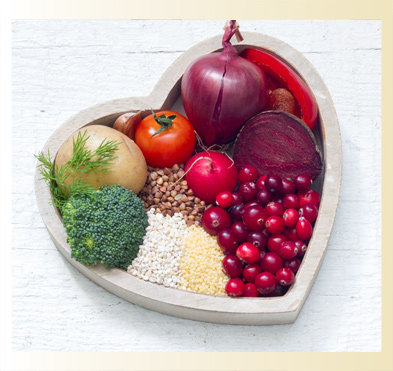




Small changes can make a difference.
Focus on making one change at a time — like swapping your soda for water or adding a serving of vegetables to every meal.
There are practical, healthy and tasty choices you can make every day, at every meal.
Here are a few guidelines to help get you started1:
 | Eat a variety of whole foods with higher levels of nutrients (vitamins, minerals, fiber, antioxidants and phytochemicals) for health benefits. Avoid high-calorie, processed foods. |
 | If you’re currently not eating or only eating a few plant foods, eat more. These include fruits, vegetables, whole grains, nuts, seeds, herbs and spices. |
 | Limit eating red meats (such as beef, pork and lamb) and avoid processed meats. |
 | If you have alcohol at all, limit it to two drinks per day for men and one per day for women. |
 | Limit eating salty foods and foods processed with salt (sodium). |
 | Avoid sugary drinks. Eat less high-calorie, low-nutrient foods. |
Red meat contains substances that are linked to certain types of cancer. Consider limiting your intake and switching to healthier alternatives. These include chicken, fish and plant-based protein sources like beans and legumes.
HOW MUCH CAN I EAT?
If you eat red meat, limit the quantity to less than 18 oz.(cooked weight) per week. And avoid processed meat.
WHAT IS RED MEAT?
Red meat includes beef, pork and lamb.
WHAT IS PROCESSED MEAT?
Some examples include ham, bacon, salami, hot dogs and sausage.
Not all calories are created equally. Some foods are high in calories but have little or no nutritional value. This is especially true for processed foods and sugary drinks. In large amounts, these foods can lead to weight gain — another risk factor linked to cancer.
The vitamins and minerals in fruits and vegetables keep the body healthy and strengthen our immune system.
Phytochemicals, antioxidants, vitamins and minerals help to protect cells in the body from damage that can lead to cancer.
Fiber foods include whole-grain bread and pasta, oats, vegetables and fruits. Gut bacteria feed on fiber. This produces compounds that may protect colon cells.
Research supporting the link between alcohol and cancer continues to grow. You can improve your overall health when you limit the amount you drink.
If you drink alcohol, limit your use to:
• One drink per day for women
• Two drinks per day for men
High salt intake can damage the stomach lining and is linked to certain types of cancer. Processed foods contain most of the salt in our diets. These include cereals, frozen meals, snack foods and canned products. Be sure to read labels for the sodium content. There is no one-size-fits-all recommendation for the daily limit of salt. So talk to your doctor about what is right for you.
1American Institute for Cancer Research (AICR). Recommendations for cancer prevention. Available at: www.aicr.org/reduce-your-cancer-risk/recommendations-for-cancerprevention. Accessed May 15, 2015.
2Kushi LH et al. American Cancer Society guidelines on nutrition and physical activity for cancer prevention. CA: A Cancer Journal for Clinicians [article online]. January/February 2012; 62 (1): 30–67. Available at: http://onlinelibrary.wiley.com/doi/10.3322/caac.20140/full. Accessed May 15, 2015.
3AICR. AICR’s Foods That Fight Cancer™. Available at: www.aicr.org/foods-that-fight-cancer. Accessed May 15, 2015.
Aetna is the brand name used for products and services provided by one or more of the Aetna group of subsidiary companies, including Aetna Life Insurance Company and its affiliates (Aetna).